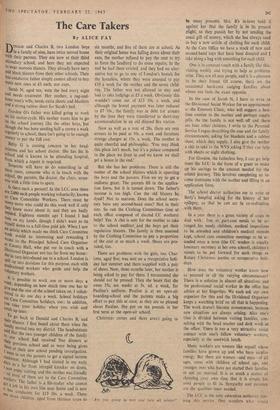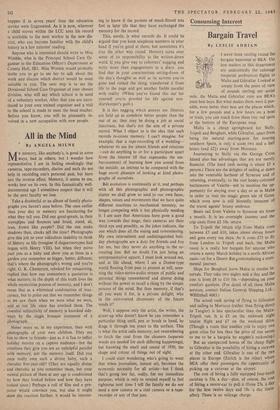The Care Takers
By ALICE FAY ONALD and Charles B, two London boys in a family of nine, have twice moved house with their parents. They are now at their third secondary school, and here they are expected to wear maroon blazers. They already have navy and black blazers from their other schools. Their bus-conductor father simply cannot afford to buy more new ones at £5 each. nor caps.
Sarah N, aged ten, wets the bed every night and needs treatment. Her mother, a rag-and- bone man's wife, needs extra sheets and blankets and a strong rubber sheet for Sarah's bed.
Gordon O's father was killed going to work on his motor-cycle. His mother wants him to go on the school journey like the other boys, but though she has been sending half a crown a week regularly to school, there isn't going to be enough money to pay the full cost.
Betty G is causing concern to her head- mistress and her school doctor. She has fits in school and is known to be attending hospital, from which a report is required. Someone will have to do something in all these cases, someone who is in touch with the school, the parents, the doctor, the clinic, some- une with a little time to spare.
is there such a person? In the LCC area there are 2,000 such people working voluntarily, known as Care Committee Workers. There must be many more who could do this work well if only they knew more about it; and they are badly needed. Eighteen months ago I found I had time on my hands, though I didn't want to tie myself down to a full-time paid job. When I saw an article which made me think Care Committee Work would be interesting and rewarding I Wrote to the Principal School Care Organiser at County Hall, who put me in touch with a bivisional Organiser not too far from my home: sile in turn introduced me to a school. London is sPlit Up into divisions for this purpose, each with Professional workers who guide and help the voluntary workers.
It is possible to work one or more days a "eek, depending on how much time one has to give and the size of the school taken on. I volun- teered to do one day a week. School holidays are Care Committee holidays, too: in addition, YOU take your holiday when you wish and catch up later.
„I° go back to Donald and Charles B, and f`neir blazers. I first heard about them when the said moved into my district. The headmistress 4itlaid that the two younger children of the family lb .°ur school had received free dinners at their previous school and so were being given at their new school pending investigation. _Went to see the parents to get a signed income daternent. Although I had started in my early 1 Ys as a far from intrepid knocker on doors, n°w enjoy visiting, and this mother was friendly -as most of them are to the Care Committee workers. The father is .a file-maker who cannot get t a job in his own line near home and is now a bus conductor for £13 10s. a week. There are e seven children, aged from thirteen years to six months, and five of them are at school. As their original home was falling down about their ears, the mother refused to pay the rent to try to force the landlord to do some repairs. In the end he had them evicted, and they had no alter- native but to go to one of London's hostels for the homeless, where they were assessed to pay £10 a week for the mother and the seven child- ren. The father was not allowed to stay and had to take lodgings at £5 a week. Obviously this wouldn't come out of £13 10s. a week, and although the hostel payment was later reduced to £7 10s., the family was in debt for arrears by the time they were transferred to short-stay accommodation in an old disused fire station.
Now as well as a rent of 28s. there are rent arrears to be paid at 10s. a week and furniture storage charges at 15s. a week. The mother is quite cheerful and philosophic. 'You may think this place isn't much, but it's a palace compared to the place we lived in and we know we shall get a house in the end.'
But she has her problems. There is still the matter of the school blazers which is upsetting the boys and the parents. First we try to get a uniform grant. The parents fill in the applica- tion form, but it is turned down. The father's income is too high. Can the old blazers be dyed? Not to maroon. Does the school secre- tary have any second-hand ones? Not in their size. So can the Clothing Committees (one at each office composed of elected CC workers) help? Yes. A chit is sent for the mother to take to the school outfitter. and the boys get their regulation blazers. The family is then assessed by the Clothing Committee to pay a proportion of the cost at so much a week. Shoes are pro- vided, too.
There are problems with the girls, too. Char- lotte, aged five, was sent on a recuperative holi- day last summer and there supplied with a pair of shoes. Now, three months later, her mother is being asked to pay for them. I recommend she should not be pressed. Then she hears that she owes 35s, ten weeks at 3s. 6d. a week, for Pauline's uniform. Pauline is at an open-air boarding-school and the parents make a big effort to pay this at once, as they are so pleased about Pauline. She put on ten pounds in her first term at the open-air school.
Christmas conies and there aren't going to 'Are you going to toss and turn all be many presents. Mrs. B's in-laws hold it against her that the family is in its present plight, so they punish her by not sending the usual gift of money, which she has always used to buy a new article of clothing for each child. At the Care Office we have a stock of new and second-hand toys that have been donated and take along a bag with something for each child.
One is in constant touch with a family like this, visiting weekly and trying to help as problems arise. They are all nice people, and it is a pleasure to be their friend. Of course, there are the occasional hard-core cadging families about whom one feels the exact opposite.
In the case of Sarah N, I have to write to the Divisional Social Worker for an appointment at the Enuresis Clinic, who will suggest a. bed- time routine to the mother and perhaps supply pills. As the family is not well off and there arc four other children, I write to the Personal Service League describing the case and the family circumstances, asking for blankets and a rubber sheet, which they supply. I also give the mother a chit to take to the WVS asking if they can help with sheets or night clothing.
For Gordon, the fatherless boy, I can get help from the LCC in the form of a grant to make up his savings to the amount needed for the school journey. This involves completing an in- come statement with the mother and filling in an application form.
The school doctor authorises me to write to Betty's hospital asking for the history of her epilepsy, so that he can act in co-ordination with them.
In a year there is a great variety of cases to deal with : free or..part-cost meals to be ar- ranged for needy children, medical inspections to be attended and children's medical records kept, school care committee meetings to be at- tended once a term (the CC worker is usually honorary secretary at her own school), children's names to be put forward for such things as Rotary Christmas parties or recuperative holi- days.
How 'does the voluntary worker know how to proceed in all the varying circumstances? There is a solution in almost all situations and the professional social worker in the office has advice at her fingertips. We each ask our own organiser for this and the Divisional Organiser keeps a watching brief 'on all that is happening. The work doesn't become monotonous, because new situations are always arising. Also one's time is divided between visiting families, con- sulting with the head teacher and desk work at the office. There is too a very attractive social contact with one's fellow voluntary workers, especially at the sandwich lunch.
Many workers are women like myself whose families have grown up and who have surplus energy. But there are women—and men—of all ages, some with children of school age, and younger ones who have not started their families or not yet married. It is so much a matter of choosing your own time that it is simple for most people to fit in. Sympathy and patience are the qualities most needed.
The LCC is the only education authority run- winter?' ning this service. One wonders what would
happen if in seven years' time the education service were fragmented. As it is now, wherever a child moves within the LCC area his record is available to the next worker in the new dis- trict, who can become familiar with the child's history in a few minutes' reading.
Anyone who is interested should write to Miss Wimble, who is the Principal School Care Or- ganiser in the Education Officer's Department at County Hall, SE1. Miss Wimble would probably invite you to go to see her to talk about the work and discuss which district would be most suitable to you. The next step is to see the Divisional School Care'Organiser of your chosen division, who will say which school is in need of a voluntary worker. After that you are intro- duced to your own trained organiser and a visit to the school is made to meet the head teacher. Before you know, you will be pleasantly in- volved m a new occupation with new people.



































 Previous page
Previous page